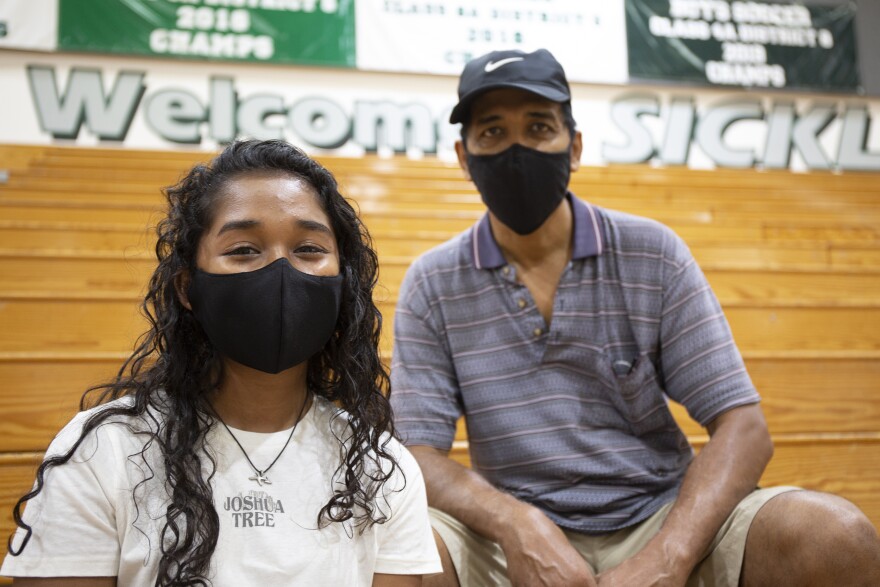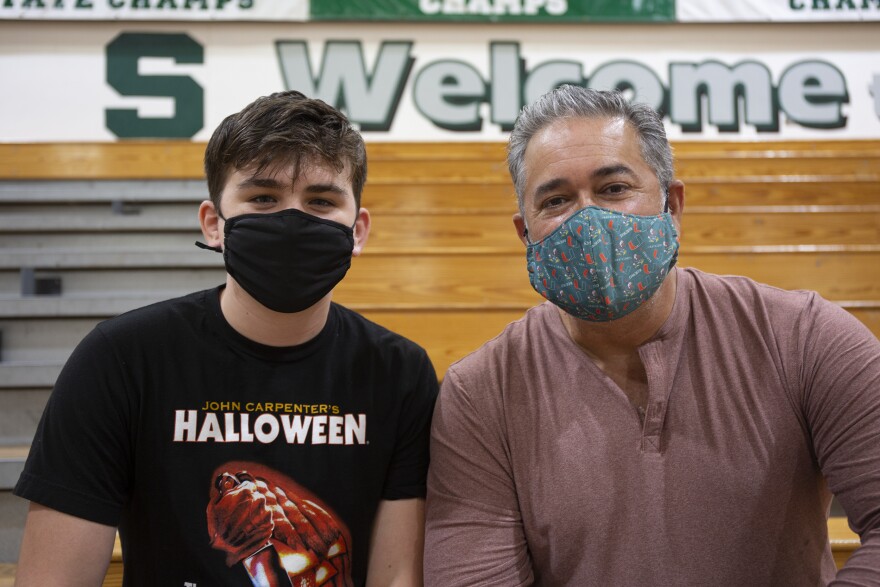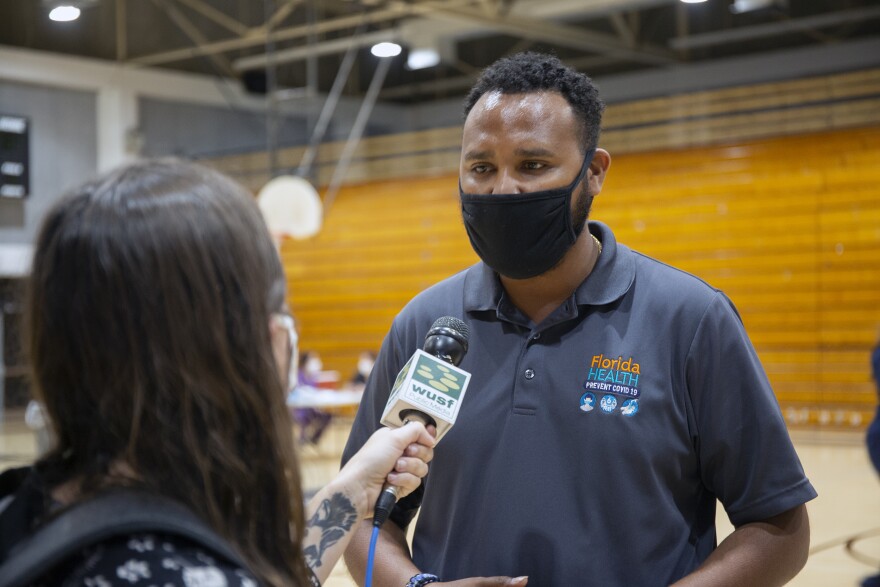Only 24% of 12- to 19-year-olds living in Florida have received a COVID-19 vaccine, according to the latest state data. Some county health departments are partnering with school districts to get students shots before they return to their classrooms in August.
Sitting on bleachers inside the gymnasiums of Robinson and Sickles high schools in Hillsborough County, teenagers shared why they got vaccinated against COVID-19:
“Because the new variants were kind of scaring me,” said Rasara Weerasuraya, 15.
Sports inspired Alonso High athlete Colin Valentin, 17, to get his shot.
“So I can be safer out there knowing that I can, you know, be free and go to school without having to wear a mask and play sports without having to worry about getting quarantined and affecting my playing time,” he said.

For Robinson High rising senior Luka Gudelj, 17, it was about social responsibility.
“I want to make sure I’m not putting any other people at risk because, I mean, I wouldn't really care myself if I got it but for other people, I would care a lot if I, like, caused somebody to die or something,” he said.
These teens were some of the more than 800 Hillsborough County students who got shots during a recent two-day vaccination campaign across seven schools last week. A small number of parents were immunized as well.
Ever since federal health officials recommended the Pfizer vaccine for kids 12 and older last month, school districts across Florida — including Miami-Dade, Orange, Alachua and Pinellas — have hosted or scheduled vaccination events for families.
Tracye Brown, chief of climate and culture with Hillsborough's school district, said it's critical now that classes will resume with 100% in-person learning, with masks optional.
“Families are concerned. Most importantly, they want their kids to have the ability to be in school but to be in school safely,” she said. “They want to make sure their kids get back to normal; they're worried about not just their academic performance but also their mental well-being.”
Several parents, like Sharea Brooks, said they had wanted to get their kids vaccinated for a while but struggled to find places offering it.
“If this didn't happen, I wouldn't have known where to go,” she said of the event at Robinson High.
Brooks and her son Elijah recently relocated to Tampa from Daytona Beach, and she said she hasn't established relationships with health providers yet. Some pharmacies offer Pfizer, but even among chains that do, it varies by location. Brooks was grateful to get an email from her son's school about the clinics.
“This is the first step for me to feel a little bit more comfortable knowing that he, at least, has the first vaccination,” she said.
William Molina said he had been calling various locations to see whether his daughter Yazmin could get vaccinated, but he wasn’t having any luck until his mother tipped him off that Sickles High was hosting an event. He said it made him more confident in the school system.
“It goes to show that they’re trying to get everyone vaccinated. They want normalcy back,” he said. “Finally being vaccinated is a big monkey off our backs.”

Parents or guardians usually have to accompany their kids for the shot, which can pose access barriers for adults who can't take off work during typical business hours. Some districts have been trying to make it easier for families.
In Broward County, students could go on their own as long as they had a signed consent form from their guardian. Hillsborough required parents be there, but scheduled its clinics for a Friday evening and Saturday.
That was a big help for Shane Miles. He took his daughter Abby, 12, to get her shot at Robinson.
“It’s perfect because I work from 8 a.m. to 5 p.m. in downtown Tampa and I just got off of work,” he said while attending the Friday evening event. “It’s more convenient; it gets it out of the way and gets her taken care of.”
Even for parents who have been working remotely during the pandemic — like Dan Valladares, whose son Dominic Waitword goes to the charter school Sports Leadership and Management Academy in Citrus Park — the weekend hours were appreciated.
“Both my wife and I work from home, but it’s still work. It’s not like we can get out so easy, we still have to work,” he said while at the Saturday event at Sickles. “We also have two little ones at home. So this makes it a lot easier for us to be able to take a Saturday when we’re not working to show up here and get this done.”
Hillsborough officials positioned the clinics at seven high schools in geographically diverse parts of the county, from facilities in the urban core all the way out to more rural neighborhoods to the north and southeast.
Despite this, turnout wasn't equal. According to numbers from the Florida Department of Health, the two schools with the fewest number of patients were Robinson, which had 80 people show up throughout the weekend, and Middleton in East Tampa, which had 73. The other schools each had well over 100.
Both Robinson and Middleton are in areas considered highly vulnerable by the Centers for Disease Control and Prevention’s Social Vulnerability Index, which looks at income levels and other factors.
They also have a large number of Black residents. The state has not responded to repeated requests for demographic data for the 12-to 19-year-old vaccination group, but racial disparities persist when looking at the total population. According to a recent analysis from the Kaiser Family Foundation, white Floridians were being vaccinated at more than double the rate of Black residents.

But no school had droves of people showing up. Kevin Watler, spokesperson with the Florida Department of Health in Hillsborough, said he was hoping to see a lot more families overall.
“Some people are just not ready. They're just not ready to decide if they want to get their children vaccinated,” he said. “Some people just really prefer it to be done at their doctors’ offices and are waiting for that opportunity. But we also believe there's quite a bit of people that don't think it's a real priority for them.”
That's what his team is trying to change.
The county hosted virtual Q&A sessions in English and Spanish ahead of the clinics, which gave parents an opportunity to have their concerns about the vaccines addressed by pediatricians and hospital physicians. Doctors explained that the mRNA technology used in the Pfizer vaccine was not rushed, and that there is no evidence the shots cause infertility.
They also stressed that even though kids are less likely to get severe COVID-19, the risks far outweigh any tied to getting a shot, and that vaccinating children can help prevent the transmission of harmful coronavirus variants in the community.
Watler said the health department will coordinate with school officials as they continue education efforts and work to reach underserved communities.
The Pfizer vaccine requires two doses administered three weeks apart, and then it takes another couple weeks for strong immunity to develop.
With many schools in Florida resuming classes Aug. 10, families only have a few weeks left to act if their kids are going to be fully vaccinated by the first day back.
9(MDAyNDY5ODMwMDEyMjg3NjMzMTE1ZjE2MA001))
Copyright 2021 WUSF Public Media - WUSF 89.7



